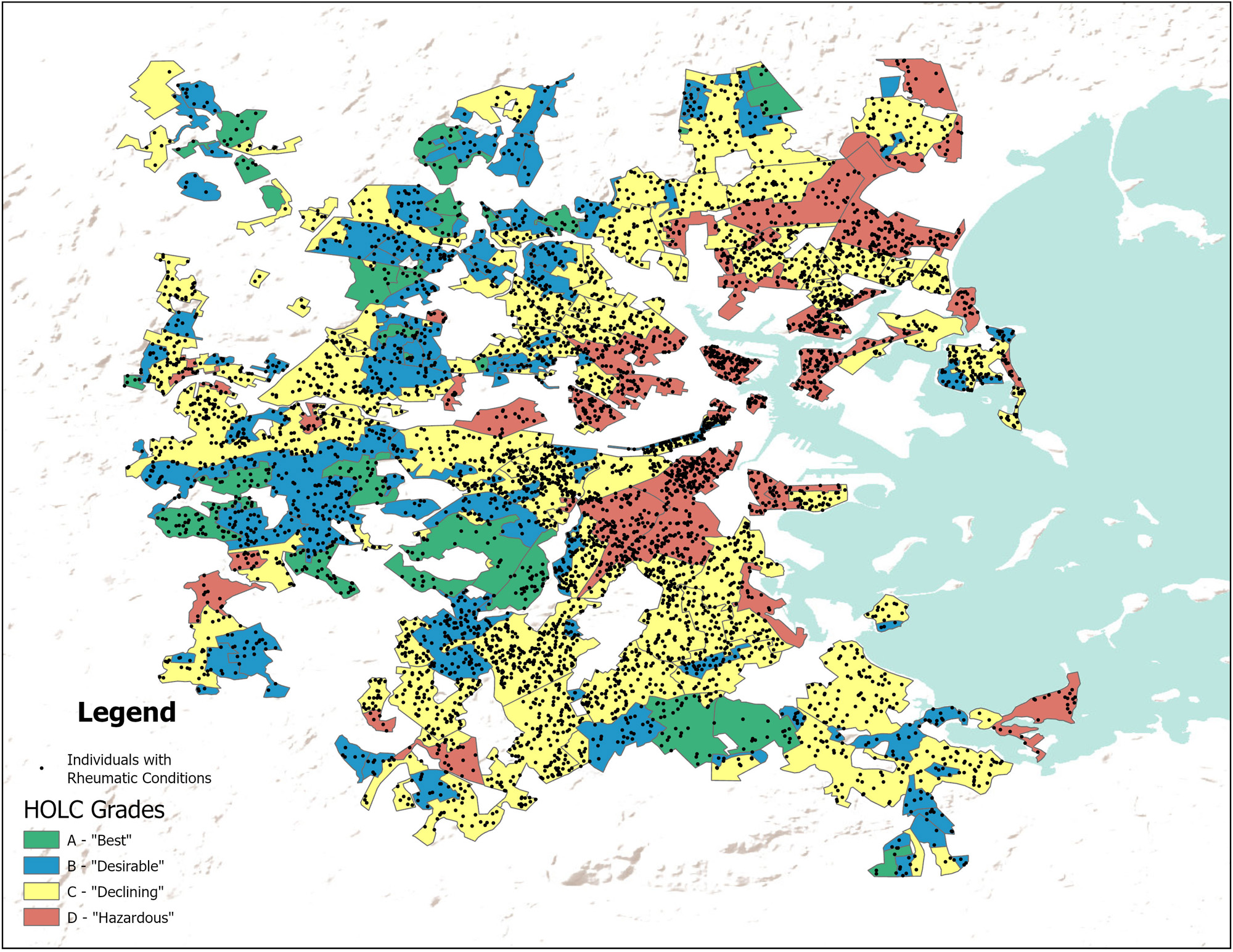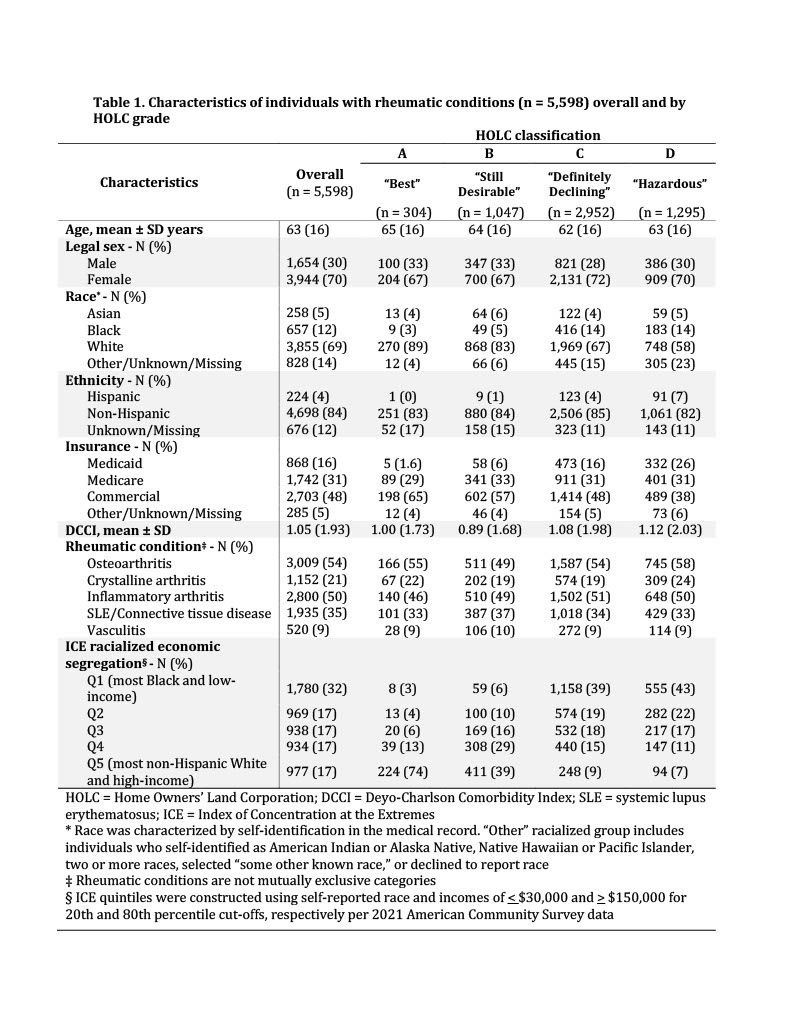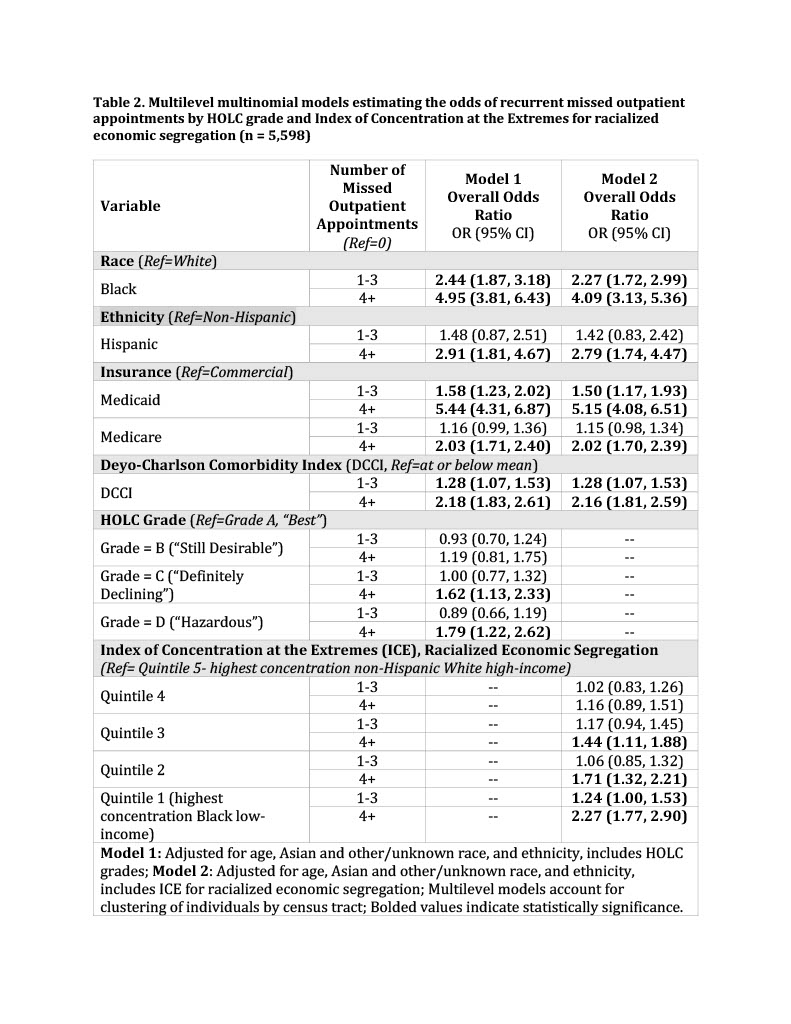Session Information
Date: Monday, November 13, 2023
Title: (1013–1032) Healthcare Disparities in Rheumatology Poster II: Socioeconomic Determinants
Session Type: Poster Session B
Session Time: 9:00AM-11:00AM
Background/Purpose: Structural racism pervades U.S. history with continued effects on health inequities. Residential segregation serves as an example, where redlining maps outlined areas with high concentrations of Black and immigrant residents as hazardous for investment, which precluded access to mortgages and home ownership. This exclusionary disinvestment in communities of color has led to the racial wealth gap. We studied the effects of historical redlining policies and present-day racialized economic segregation, measured by the Index of Concentration at the Extremes (ICE), on missed outpatient appointments, an indicator of access to sustained care, among individuals with rheumatic conditions.
Methods: Using a multihospital clinical data repository, we identified adults 18 years with New England addresses and 1 ICD-10 code for a rheumatic condition who received rheumatology care within 3 years of 1/2023. We defined the index date as the date of the third code for the same rheumatic condition and the baseline period as one year prior to the index date. Home addresses were geocoded and overlaid with 1930s Home Owners’ Loan Corporation (HOLC) redlining vector files. The ICE for extreme high vs. low combined racial and income polarization at the census tract level was constructed using 2021 American Community Survey data. We used multilevel, multinomial logistic regression models to examine the odds of 1-3 and 4 missed outpatient appointments (Ref.=0) over 2 years post index date separately by historical HOLC grade (A “best” to D “hazardous”) and ICE quintile (most deprived (Q1) to most privileged (Q5) area for combined race and income), adjusting for demographics, insurance, and comorbidities.
Results: Among 5,598 individuals with rheumatic conditions, 1,935 had SLE/connective tissue disease, 2,800 inflammatory arthritis, 1,152 crystalline arthritis, and 3,009 osteoarthritis. The mean age was 63 (SD 16) years, 70% were female, 12% Black, and 4% Hispanic (Table 1). 23% lived in the most historically redlined areas (Figure 1), and 33% in areas with the most extreme present-day racialized economic deprivation (ICE Q1). Among 1,780 individuals living in ICE Q1 areas, 96% were in areas that were historically deemed hazardous (HOLC D) or declining (HOLC C). 1,915 (34%) individuals had 0 missed appointments, 1,783 (32%) had 1-3, and 1,900 (34%) had 4. Accounting for individual-level factors, patients living in the most historically redlined areas vs. the least had 1.79 times greater odds (95% CI 1.22-2.62) of 4 missed appointments. Individuals living in areas with the greatest concentration of lowest-income Black households vs. highest-income White households had 2.27 times greater odds (95% CI 1.77-2.90) of 4 missed appointments (Table 2).
Conclusion: Individuals with rheumatic conditions living in historically redlined areas and current areas with highly concentrated racialized economic deprivation had significantly greater odds of repeated missed appointments. Legacies of residential segregation persist and contribute to rheumatic disease disparities. Policy interventions that dismantle structural racism are needed to address inequities in consistent access to care for patients with rheumatic conditions.
To cite this abstract in AMA style:
Yang S, Santacroce L, Feldman C. Association of Historical Redlining and Present-Day Neighborhood Inequities with Missed Outpatient Appointments Among Individuals with Rheumatic Conditions [abstract]. Arthritis Rheumatol. 2023; 75 (suppl 9). https://acrabstracts.org/abstract/association-of-historical-redlining-and-present-day-neighborhood-inequities-with-missed-outpatient-appointments-among-individuals-with-rheumatic-conditions/. Accessed .« Back to ACR Convergence 2023
ACR Meeting Abstracts - https://acrabstracts.org/abstract/association-of-historical-redlining-and-present-day-neighborhood-inequities-with-missed-outpatient-appointments-among-individuals-with-rheumatic-conditions/



